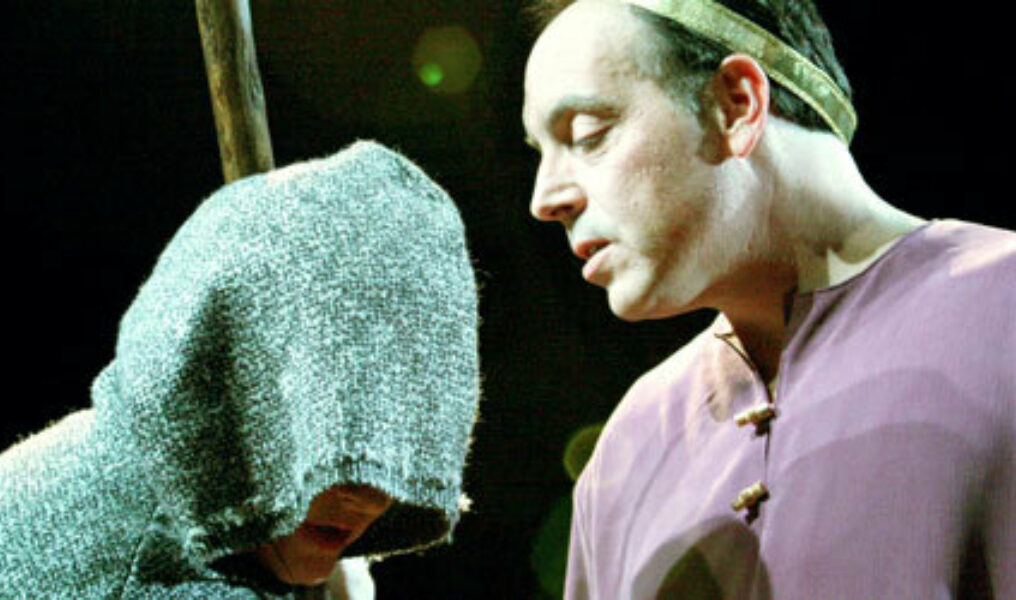By Bridgette M. Redman

Go.
That's all that needs to be written about the production of "Oedipus" at Williamston Theater. Further words spill into the realm of superfluous. Calling it a "must-see," while accurate, cheapens the imperative with cliche. Simply, go.
However, this is a review and not a Facebook status, so it will venture further.
The story of Oedipus had permeated the culture by the time it was first presented in 429 BC, but Sophocles (with a boost from Freud) ensured that the horror of the Oedipus story would resonate through time. Yet, it is not a story of incest. Better to call it what the chorus tells the audience in the beginning. It is the story of a man whose flaws make him human and are the source of his undoing.
With the brilliantly adapted script by Tony Caselli and Annie Martin, Oedipus emerges as an almost divine figure. Like the epic protagonists of the genre, he is a great man, a hero. He personifies bravery, intelligence and charisma while caring deeply for his people. He lives a richly deserved charmed life. He loves deeply, serves faithfully and judges wisely.
His flaw is not named, but over and over, Oedipus reveals it. Those who love him easily forgive his impetuous rage for his penitence is real and his fairness quickly attempts to make things right. And who among us humans is not flawed? However, this is Greek tragedy and it will be his flaw even more than fate that brings Oedipus down, destroying him and the lives around him. Fate and the gods are easy scapegoats, but prophecies aren't needed to foretell that Oedipus' wrath and hubris will tear him apart.
All these factors elevated "Oedipus Rex" to a classic centuries ago, but it is its treatment at Caselli and Martin's hands that infuses it with a relevance and powerful theatricality that creates the story anew. The plot cleaves faithfully to the original and they resist co-opting cheap copies of readily recognized public figures or events. They chose language that is neither poetically elevated nor lowered to slang. Rather it is clean and clear, maintaining sharp focus on the story.
They concentrate the chorus into a single cello player, Jamie Weeder, who provides a subtle mood-setting soundtrack while occasionally injecting narration. John M. Manfredi embodies the highly charismatic king and savior of Thebes. As the well-beloved ruler, Manfredi quickly establishes his rapport with genuineness and the constant eye contact that transforms the entire audience into Thebans, residents whom he treats as beloved equals.
Sandra Birch, Barton Bund and Brandon Piper take on all the other characters, assisted by Holly Iler's simple costume changes that quickly communicate rank, health and personality. The three move with perfect choreography, creating the illusion of the Sphinx's implacable grandeur, the despair of a city filled with plague and death and the horror of those who must bear witness to the downfall of their exalted hero.
Each actor masterfully steps in and out of the crowd to assume the mantle of the named characters. Bund's affable Creon lifts Oedipus even higher before his fall, while Birch's Jocasta is a beloved and trusted equal. Piper sparks one of the few comedic moments of the play as he brings would-be tragic news that delights the Theban rulers. All four actors interact with intensely genuine relationships, often using a physical closeness that would be weakened in a larger space.
Birch's Tieresis is particularly powerful, as the blind prophetess sees with a clarity surpassing anyone else on stage. She adds intense weight to the tragedy as Oedipus forces the inevitable and the audience, who already knows the truth that Oedipus is seeking, sees how futilely she tries to avert tragedy.
Supporting the superlative acting were perfectly executed design choices. Rearranged seating created an intimate theater in the round, with audience surrounding on all sides the oval stage with its skeletal structure supporting royal red banners. Nor do the actors create any walls, with Jocasta, Tieresis and Creon transforming the audience into the residents of Thebes that they address and appeal to.
The simplicity of Daniel Walker's set design and Iver's costume design intensified the play's power. Nothing was wasted. Nothing was an after-thought. Nothing was extraneous. Rather, every stroke of color, every piece of structure and every scrap of costume were infused with metaphor and intent. The muted costumes deepened the dramatic red of the banners as they swooshed into places as needed.
In the very beginning, the chorus blatantly tells us that light is as much a part of the story as the words and movements of the character. Dana White's lighting design fulfills the expectation, letting the changing colors and lights clue the audience in to the pleasures of the gods and the changes in the fortunes of the characters and the city.
Director Caselli leads a dazzling cast and crew in breathing as intense a life and significance into the acclaimed Greek tragedy as when it first competed (and lost) against Aeschylus' trilogy about the same family. It forces us to examine the havoc caused by being flawed, by being human.
It comes back to the first paragraph of this review: If you care about relevance in the theater, if you believe classics truly are timeless, if you want to see universality in action, go. Don't let snow nor budget nor demands on your time stop you. Go. Go twice.
REVIEW:
'Oedipus'
Williamston Theatre, 122 S. Putnam Rd., Williamston. Thursday-Sunday through Feb. 20. $18-$24. 517-655-7469. http://www.williamstontheatre.org.










